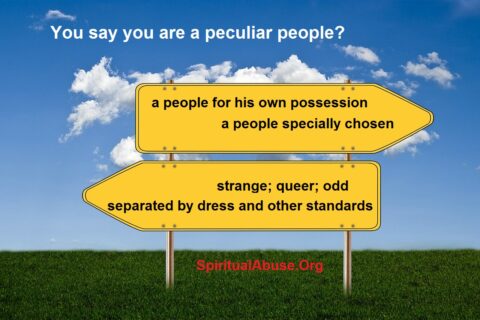For those still trying to sort through the doctrines you were taught in an unhealthy church, here are some things to consider that should be helpful.
1) Keep the passage in its context. One can make it appear to seem like a passage is teaching something different when it is taken out of context or partially quoted. You need to read the surrounding verses, and sometimes chapters, and not just the proof-text given.
2) Beware of assigning a word an incorrect definition. Many in unhealthy churches assign words meanings which do not reflect their biblical meaning. If one doesn’t look further into this, they can be led to believe the Bible teaches something totally different than it does. Some words that readily come to mind from my old church organization are long, peculiar, shamefacedness and hallelujah (the latter probably only pertains to my former church). Nowadays it is very easy to look up the basics of the original Greek or Hebrew words used in the Bible. Your modern day dictionary is not what you should use.
3) Look at the overall picture. Discover what the ‘whole,’ or all, of the Bible teaches on a subject and not just a few passages. Unhealthy churches piece together passages to support some teachings. Yet if you study what the entire Bible says on the subject, you will find what they say really isn’t taught in scripture. You won’t find the doctrine being stated by the apostles or Jesus and you won’t find any examples of them doing (whatever) it is. Complete concordances are found in abundance to help you find every instance of a word in the Bible.
4) Interpret a difficult passage in light of those that are clearly understood. When one passage seems to not fit in with the rest of scripture on a subject, we need to interpret that passage in light of what is clear. The teachings aren’t going to contradict themselves. For instance, if there is one verse that on the surface could appear to say something is a matter of salvation, and yet that is never explicitly stated anywhere in the Bible, then you are probably understanding it incorrectly. It needs to be interpreted by the passages that are clearly understood.
5) Set aside preconceived ideas and take care to not read things into a text which are not stated. When we read the Bible, we should approach it in a way that God can speak to us through it. That’s hard to do if we are dead set in our minds that we know it all and that our interpretation must be 100% accurate. This is what causes many in Pentecostal churches, when they read in the Bible about the Holy Spirit, to automatically think ‘speaking in tongues‘ even if it is not in the text. Thus we read into scripture our thoughts or what we have heard taught in church and we aren’t going to learn that way. Don’t set about to prove what you believe is correct or to prove a doctrine to be false. Instead, approach your studies with wanting to know what the Bible teaches, regardless of what you think it does or doesn’t teach.
Leaving An Unhealthy Church #1: You and Those Who Remain
Leaving An Unhealthy Church #2: Anything You Say Can, And Will, Be Used Against You
Leaving An Unhealthy Church #3: Why It May Be Important To Resign Your Membership
Leaving An Unhealthy Church #4: Remaining in the Same Organization
Leaving An Unhealthy Church #5: Don’t Listen To The Gossip
Leaving an Unhealthy Church #6: How You Are Treated
Leaving an Unhealthy Church #7: It Happens To Ministers, Too
Leaving an Unhealthy Church #8: The Way Of The Transgressor Is Hard!
Leaving an Unhealthy Church #9: Some Must Return To Remember Why They Left
Leaving An Unhealthy Church #10: Sorting Through The Teachings
Leaving an Unhealthy Church #11: Confusion & Not Knowing Who or What to Believe
Leaving An Unhealthy Church #12: Can I Go To A Church Where I Don’t Agree With Everything?
Leaving An Unhealthy Church #13: A Warped View of God
Leaving An Unhealthy Church #14: Looking For A New Church Part 1
Leaving An Unhealthy Church #15: Looking For A New Church Part 2 (Leaving Your Comfort Zone)
Leaving An Unhealthy Church #16: Looking For A New Church Part 3 (Triggers)
Leaving An Unhealthy Church #17: Looking For A New Church Part 4 (Manifestations/Demonstrations)
Leaving An Unhealthy Church #18: Looking For A New Church Part 5 (Church Attendance: A Matter of Life or Death?)










